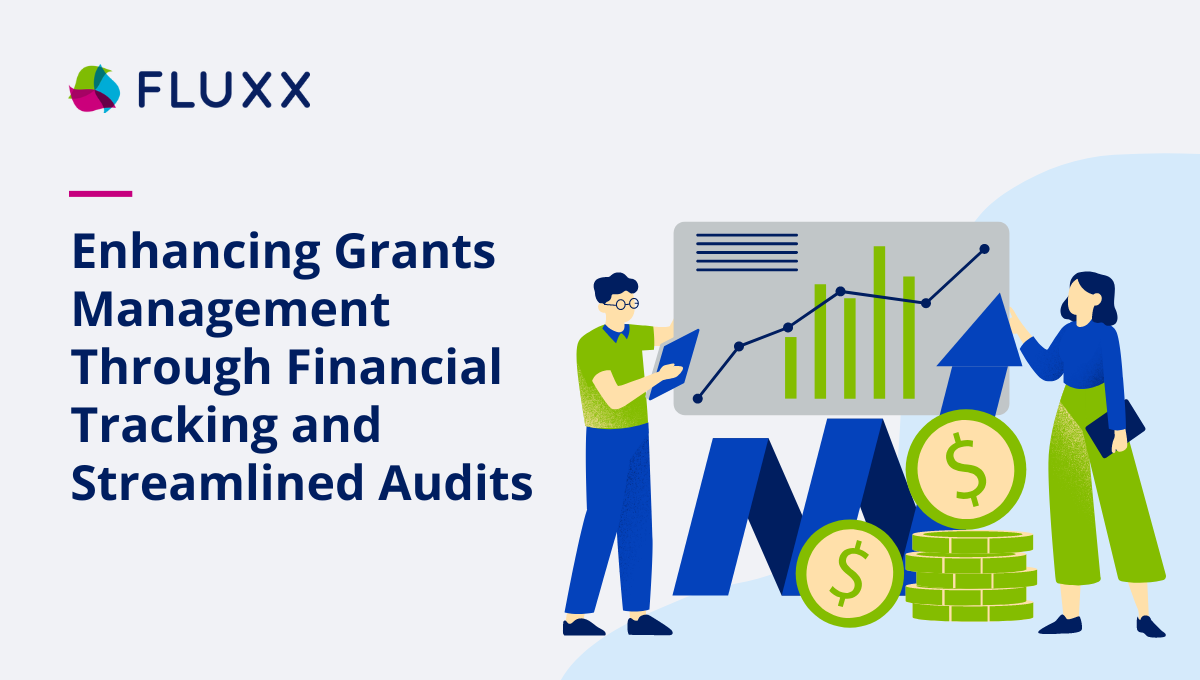
In the world of grants management, maintaining a comprehensive financial tracking system and implementing efficient audit processes are paramount. These practices not only ensure accountability and transparency but also enable organizations to make informed decisions, budget accurately, and comply with funding requirements. This article explores the key strategies and benefits associated with effective financial tracking and streamlined audits in grants management based on the research findings featured in our “From Modernizing Systems to Transforming Outcomes” whitepaper.
How to Track Finances Appropriately in Grants Management
It is essential for an organization to establish clear financial policies and procedures to effectively track finances in grants management. These guidelines should provide a framework for consistent and standardized financial practices within an organization from pre-award program planning and budgeting to post-award expense tracking. Additionally, it is crucial to implement robust accounting systems and software.
Modern technologies enable accurate and efficient tracking of income and expenditures, reducing errors and enhancing data reliability. Documenting all financial transactions and maintaining proper records are equally important, ensuring transparency and facilitating future audits.
Benefits of Comprehensive Financial Tracking in Effective Grants Management
Comprehensive financial tracking systems yield several benefits in grants management. First, they promote responsible utilization and transparency in the use of grant funds. According to our whitepaper, organizations with robust financial tracking systems are “better equipped to demonstrate accountability in terms of payment requests and transactions against the overall grant.” In addition, such systems facilitate accurate budgeting and financial planning from the grantor’s funding sources that flow through a hierarchy of programs and funding opportunities which aggregate individual grant awards and each of their related transactions. By reducing reliance on manual tracking methods such as Excel, organizations can create more precise budgets to better enable effective resource allocation.
Comprehensive financial tracking also allows organizations to identify potential cost savings and efficiencies. By analyzing structured financial data in a grants system such as multi-line grantee budgets or spend rolled up to the program level, organizations can identify areas where expenses can be minimized without compromising program effectiveness. Additionally, comprehensive tracking supports informed decision-making. The availability of accurate financial data empowers organizations to make strategic decisions regarding grants management, resulting in better outcomes and a greater overall impact.
How to Streamline the Audit Process in Effective Grants Management
Organizations should start by thoroughly understanding the audit requirements outlined by the specific government agency providing the grant. This includes familiarizing yourself with the Uniform Guidance (2 CFR 200) and any additional guidelines or regulations applicable to your grant program. Based on this understanding plans should be developed that identify key deadlines, establish internal controls, and organize documentation to ensure easy access and retrieval of required information.
Document these controls and ensure they are consistently followed throughout your organization by adopting enabling technology that can bring these controls and processes to life by enforcing user compliance in a purpose-built grants management system. Additionally, conduct a risk assessment to identify high-risk areas in your grant program and address those risks through controls in your grants management system. Focus on these areas during the audit to ensure compliance and allocate resources efficiently. This will help streamline the audit process by targeting the most critical aspects of your organization's operations.
Benefits of Streamlining the Audit Process in Effective Grants Management
Streamlining the audit process brings several advantages to grants management. Findings from the aforementioned whitepaper suggest that a streamlined audit process significantly saves organizations time by reducing the “administrative burden on agency staff and grantees.” This added efficiency allows organizations to focus more on program implementation and mission-related goals. Furthermore, streamlined audits enhance compliance with funding requirements and regulations. By implementing efficient audit practices, organizations can minimize the risk of non-compliance, ensuring adherence to stipulated regulations.
Automating review processes with integrated data, centralized documentation, and granular audit trails is critical for modernizing grants management. By integrating financial data with government databases, organizations can streamline their audit processes further by reducing manual data entry. This integration improves data accuracy and facilitates smoother communication with funding agencies. Leveraging technology will facilitate open and transparent communication with the auditors throughout the process. Organizations can address any questions or concerns promptly, provide requested information in a timely manner often directly from the grants system, and proactively discuss any challenges or complexities related to the audit. Effective communication enhanced by a system can help streamline the audit by facilitating a smoother exchange of information.
Potential Problems in Financial Tracking for Grants Management
Several challenges may arise in financial tracking for grants management. Inadequate financial infrastructure and software systems can hinder effective tracking and reporting. Lack of knowledge and skills in financial management among staff members may lead to errors and inaccuracies. Additionally, insufficient resources and funding can pose obstacles to implementing comprehensive tracking systems. Scalability is a significant limitation of certain grants management systems that require substantial investments for enhanced features, making them less accessible for organizations with limited resources.
Strategies to Address Potential Problems
To overcome these challenges, organizations should invest in financial management training and capacity building for their staff members. This equips them with the necessary skills and knowledge to handle financial tracking effectively. In addition, seeking external expertise and support can provide organizations with valuable insights and guidance.
Implementing internal controls and conducting regular internal audits are crucial steps to ensure accurate and reliable financial tracking. These measures not only help identify and rectify errors in a timely manner but also improve overall financial management practices. Furthermore, periodic reviews and evaluations of financial tracking processes allow organizations to identify areas for improvement and optimization.
Conclusion
Comprehensive financial tracking and streamlined audit processes are vital for effective grants management. These practices promote accountability, transparency, and accurate budgeting. To learn more about enhancing grants management, download our whitepaper on Modernizing Systems today.